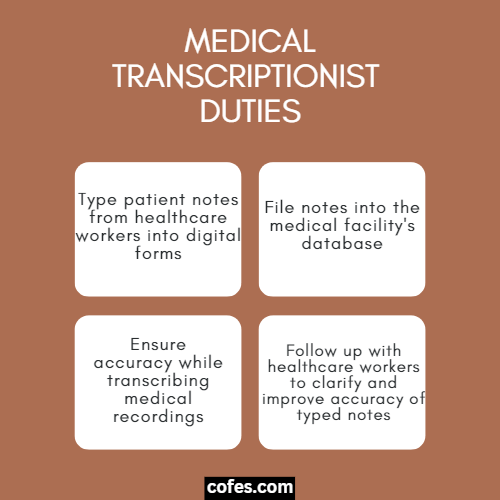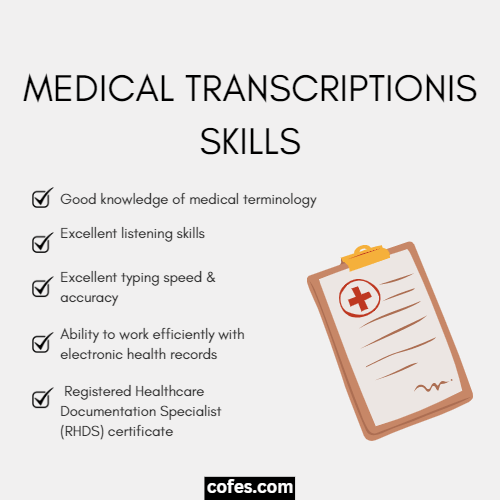The Ultimate Resource for Medical Transcriptionists
If you’re looking for a career change and you have excellent listening and typing skills, then becoming a medical transcriptionist may be a good career choice for you.
It’s potentially not the career you wanted as a child, but it pays well and has many benefits that we will discuss below.
If you want to learn more about the benefits and what exactly a medical transcriptionist has to do, continue reading to get all the information you need to make a decision.
Medical Transcriptionist Information Table
| Official Job Title | Medical Transcriptionist |
| Average Salary | $50,388 |
| Stress Level | High |
| Work / Life Balance | Good |
| Job Satisfaction | Low-Average |
| Career Advancement | Low-Average |
Medical Transcriptionist Job Description
What Is a Medical Transcriptionist?
A medical transcriptionist works with healthcare workers to turn recorded patient notes into written records that can be stored on a patient’s file and accessed on subsequent visits.
It’s a critical job, and accuracy is vital to ensure that all patient information is accurate. Otherwise, it could disrupt care or cause further issues for patients.
What Does A Medical Transcriptionist Do On A Daily Basis?
A medical transcriptionist will receive recorded patient notes or dictation from healthcare workers.
They will listen and type the notes into a written record and then file them into the facility’s medical record system.
Part of the process will involve reviewing their written notes to ensure accuracy, including all fields filled out, grammar and spelling are correct, and correct medical terminology is used.

Responsibilities, Duties & Roles Of A Medical Transcriptionist
The responsibilities of a medical transcriptionist appear simple, take recorded notes and turn them into written notes.
However, when dealing with medical records, it’s imperative to ensure accuracy and consistency.
- Review and transcribe medical recordings into standard written reports.
- Ensure the accuracy of all reports
- Follow up if there are issues with the recording or clarifications that are needed.
Medical Transcriptionist Salary
Average Salary
The average salary for a medical transcriptionist is $50,388 per year.
Which is relatively high for typing out recorded audio, but it shows how important the type of transcription is.
Typing out medical records poorly can have a significant effect on patients.
Missed information or incorrect information is not acceptable when dealing with health issues.
Starting Salary
The starting salary for a medical transcriptionist can be as low as $44,886 per year.
This is a reasonable starting salary for anybody.
However, if you’re being offered lower, you should investigate further to see the standard rates in your area.
Senior Salary
A senior medical transcriptionist can earn up to $58,622 per year.
So you can see a medical transcriptionist starts on a relatively high salary, but the progression after that is somewhat slow.
How to Become a Medical Transcriptionist
The Entry Level: Certification, Training & Degree
The minimum requirement for a medical transcriptionist is certification from a medical transcriptionist program.
This certification allows you to work in most entry-level positions.
Some employers prefer you have a two-year associate’s degree in medical transcription from a college, and this option would open up more opportunities for you.
Other Skill Sets, Requirements & Qualifications
Two critical skills to becoming a medical transcriptionist are excellent listening skills and fast typing skills.
Without these two vital skills, it will be difficult for you to perform your work.
While certification may not be required in all positions, you may be expected to have two certificates depending on your length of experience.
Both certificates can be gained online or at your local college.
- Entry-level medical transcriptionists may need the Registered Healthcare Documentation Specialist (RHDS) certificate.
- If you have more than two years of experience and want to open more opportunities for your career, you can get a Certified Healthcare Documentation Specialist (CHDS)
How Long Does It Take To Become A Medical Transcriptionist?
Assuming you have a high school diploma or GED, you can take a medical transcriptionist certificate course, which could take around nine months to complete.
Taking two years for an associate’s degree will open up more opportunities for employers that want that level of education.
Is It Hard To Become A Medical Transcriptionist?
It’s not difficult to become a medical transcriptionist.
If you can master the two vital skills of listening and type quickly and complete at least a nine-month certificate, then you will be ready to enter the medical transcriptionist profession.
Medical Transcriptionist Career Paths
The Medical Transcriptionist Roadmap

A medical transcriptionist often starts at an entry-level position.
As your career progresses, you may want to stay in the role.
However, if you are looking to increase your salary or responsibilities, there are a few direct paths to progress.
- Become a Quality Assurance transcriptionist. This type of role will go over other transcriptionists’ work and ensure the records contain no errors and are absolutely correct based on your advanced knowledge.
- You can become a team leader or supervisor of other medical transcriptionists—Mentoring and advising the best approach and supervising their work.
- Most medical transcriptionist work is outsourced from actual medical facilities.
- Consider starting a medical transcriptionist business.
- With advanced experience and skills, you might also want to start teaching new medical transcriptionists online or at colleges.
Projections For Growth In Medical Transcriptionist Jobs
Medical transcriptionist job growth is expected to decline by 7% over the next nine years.
This decrease is likely due to the ease of dictating into devices and having it automatically transcribed for you.
The only issue there is the accuracy that doctors may or may not want to deal with.
In Summary: Is Medical Transcriptionist A Good Career?
A career as a medical transcriptionist is great, and there is easy access to the roles with minimal education.
The pay is relatively high compared to other similar jobs as well.
Medical Transcriptionist Working Conditions
Can A Medical Transcriptionist Work Remotely From Home?
A medical transcriptionist can work remotely from home without any issues.
There is no specific requirement to meet anyone in person.
In most cases, you will listen to digital audio files, transcribe electronic documents, and file into digital filing systems.
Unless you work in a small outdated doctor’s office that requires analog audio devices and physical printouts, a work-from-home schedule should be acceptable.
How Many Hours Does A Medical Transcriptionist Work?
Medical transcriptionists work the standard 9-5 job.
Work is always coming in, so it’s impossible to complete everything.
There is no real reason to work outside regular hours.
Can A Medical Transcriptionist Work Part-Time?
If your workload allows part-time work, then it’s possible.
If you’re fast and accurate, you may even find that you can cut down the time required to complete the tasks you need to do each day.
What Are The Average Vacation Days Of A Medical Transcriptionist?
Medical transcriptionists get the standard vacation time that all employees get.
The average is ten days per year plus statutory holidays.
You may receive more time the longer you work at the same location or the more senior you are.
Alternative Careers & Similar Jobs to a Medical Transcriptionist
- Medical Records Technician
- Medical Office Administrator
- Medical Laboratory Technician
- Medical Researcher
- Forensic Science Technician
- Radiologic Technologist
- Cardiovascular Technologist
- Physical Therapy Assistant
- Phlebotomist
- Pharmacy Assistant
- Dispatcher
- Grant Writer
- Office Manager
- Chemical Dependency Counselor Assistant
Medical Transcriptionist Resume Tips
A vital skill to list on our resume is your typing speed.
The faster you can type, the better.
If you have information on your accuracy, that would be even better.
Any certifications or training you have completed will be important.
Any previous experience in healthcare would be helpful.
You are not just transcribing everything word for word.
You need to ensure a good understanding of medical terms to ensure accuracy.
Medical Transcriptionist Interview Questions
Q1: What type of transcription do you find the most challenging?
Why it works: There are a variety of different types of transcription, and this may expose any weaknesses in the candidate’s knowledge.
If they don’t even know there are different types, that may be a significant red flag.
Q2: What would you do if somebody directly asked you for a copy of a transcript?
Why it works: Medical transcriptions deal with confidential medical records.
Providing access to these records outside the facility’s filing system would be a significant privacy issue that the candidate should understand.
If their answer is anything other than no, that would be a problem.
Q3: What would you do if an audio file had parts which are not audible?
Why it works: This is a common issue for medical transcriptionists.
Anybody working in this field should have a reasonable of how to best approach the problem.
If a candidate has no answer, it shows no experience as well as no problem-solving skills.
Jobs Related to Medical Transcriptionists
- Legal secretaries
- Data entry specialists
- Court reporters
- Medical coders and billers
- Billing clerks
For HR Managers: Tips for Hiring A Medical Transcriptionist
Key Characteristics To Look For In A Medical Transcriptionist
Some key characteristics of a great medical transcriptionist are:
- Good knowledge of medical terminology.
- Excellent typing speed and accuracy are core components of the job.
- Great listening skills, which is half of the job.
- Good computer skills as they will be dealing with electronic health records.
Minimum Level Of Education & Experience
A medical transcriptionist should have completed their high school diploma or GED.
They should then have completed a course in medical transcription and received their certificate.
Depending on the level of medical transcriptionist you require, it may be even better if they have an associate’s degree in medical transcription.
Outside of that, ensure great listening skills and fast, accurate typing skills.
